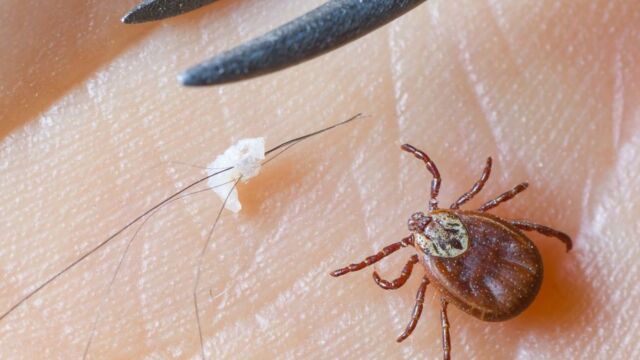Tick-borne virus raising alarm in the UK: The initial symptoms you should know about

There have been three cases of tick-borne encephalitis in England since 2019 and it can cause a range of deadly diseases.
A deadly tick-borne virus that can cause meningitis has been found in several areas of the UK, health officials have warned. The tick-borne encephalitis virus (TBEV) was detected in Yorkshire last year, and also in the Loch Earn area in Scotland. Health officials also believe there was a case in the Hampshire/Dorset and Norfolk area, prompting fears that the tick species is widespread in the UK.
Discover our latest podcast
TBEV can result in serious disease including infection of the brain (encephalitis) or the membranes around the brain and spinal cord (meningitis). Officials are urging people to be wary when walking through woodland and wear appropriate clothing to reduce the chance of tick bites.
More under this adMore under this adInitial symptoms of tick-borne encephalitis virus
Many people infected with TBEV do not have symptoms or perhaps just mild flu-like symptoms—so it can be hard to tell if you've been infected, especially during the flu season. However, in some cases it can lead to very serious illness such as meningitis and encephalitis, as per CDC:
- Initial symptoms can include fever, headache, vomiting, and weakness.
- A few days later, severe symptoms can develop including confusion, loss of coordination, difficulty speaking, weakness of the arms or legs, and seizures.
- Sometimes initial symptoms last a few days and completely resolve, but then about a week later the more severe symptoms develop (known as ‘biphasic illness’).
Despite the findings it is thought that the chance of contracting TBEV is still very low. Dr Meera Chand, deputy director at the UKHSA, said, as per Sky News:
More under this adMore under this adOur surveillance suggests that tick-borne encephalitis virus is very uncommon in the UK and that the risk to the general population is very low.
Read more:
⋙ If you sleep less than 8 hours a night, you are at risk of developing this disease
⋙ Young girl contracts 'unusual' disease after iguana steals her cake
The best protection against contracting a tick-borne disease is to avoid being bitten
— What makes viruses tick? (@VirusesTickCVR) April 5, 2023
Check out our infographic below to discover more about tickborne encephalitis virus (TBEV), as reported by UKHSA today https://t.co/zoltkZmDf3pic.twitter.com/kmCX1LChZo
Read more:Alarm over mysterious 'nosebleed' disease that can kill in over 24 hours, should we be worried?
How to prevent tick-borne encephalitis virus (TBEV)
There are several steps to help prevent TBEV, including wearing long trousers and long sleeve shirts when walking through long grass or woodland. Ian Jones, professor of virology, University of Reading explained, as per The Independent:
The virus is found naturally in some ticks and gets transferred to a person if they are bitten (only if the tick is infected), usually on bare arms and legs whilst walking through undergrowth. Wearing appropriate clothing essentially removes the risk.More under this adMore under this ad
Ticks can also carry various other infections such as Lyme disease so if you do go walking in long grass it is important to check for ticks afterwards and remove them promptly.
Vaccines are also used in areas of high incidence across Europe and so may be considered here in the future for people who work in jobs where they spend a lot of time outdoors.
More under this adMore under this adMembers of the public who become unwell after a tick bite should seek GP advice, and urgent medical attention if they believe they have symptoms of meningitis or sudden neurological episodes.
Sources used:
Sky News 'Tick-borne virus detected in several areas in England, UKHSA warns'
The Independent 'Warning as deadly tick-borne virus detected in several areas in England'
Centers for Disease Control and Prevention (CDC) 'Tick-borne encephalitis (TBE)'